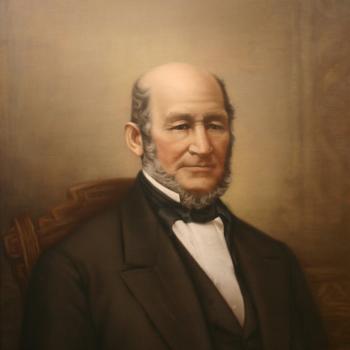
Few voices are as inimitable or instantly recognizable as that of Bing Crosby. Warm, yet cool, he defined an American generation, and he remains one of the best-selling pop singers of all time.
In 1977, Bing Crosby gave his last televised interview. The interviewer, Barbara Walters, was known for asking prying, uncomfortable questions. She chose to leave no stone un-turned when it came to interrogating Bing about culture, morality, and its connection to his own family. Walters maintains a pleasant tone throughout, but it is clear that she saw herself as one of the cultural elite, while Crosby represented a generation whose cultural influence was gradually slipping away.
However, if she expected to one-up or throw off the Crooner King, she was sadly mistaken. And thanks to YouTube, we can see for ourselves just how mistaken she was.
After some pleasant chat about Crosby’s successful second marriage, the uncomfortable questions begin around ten minutes in. The first few center around the four sons Crosby had with his first wife, Dixie Lee. Their marriage entered a gut-wrenching downward spiral when she became an alcoholic, and it is believed to have affected their children in the womb. She died young of ovarian cancer, and the most haunting image of Bing was captured at her funeral. He is covering his face as he sits in the car with his sons, while reporters were swarming vulture-like around the burial.
Those boys went on to ruin their lives in various ways, as Bing describes with unvarnished honesty to Walters: “They quarreled and quarreled. They had several agents and they quarreled with them, quarreled with their employers, quarreled with their wives. They had some miserable years. I tried to help, but it’s hard to do that, when they’re that old.” However, he reported that after the passage of time, his sons were now settled and happier. Tragically, they were anything but, as two of them would go on to commit suicide after Bing’s death.
Crosby’s son Garry famously wrote a tell-all book in which he accused his father and mother of abusive parenting, using words like “beating” or “hitting” to refer to what used to be known as just “spanking.” It was published six years after Bing’s interview with Walters, but Bing himself had already made no secret of the fact that he spanked his children, typically with a strap or a hairbrush. He has nothing to hide as he matter-of-factly answers Barbara’s questions about this time-honored manner of meting out discipline, but her liberal sensibilities are clearly shocked. However, he freely admits that he has been a better father to the children of his second wife, largely because he has been more intentional about spending time with them. He draws the curtain of quiet charity over the fact that his first wife’s physical and mental illness undoubtedly took a shattering toll on that entire first family as well.
It is at this point that Walters attempts to deliver her coup de grace of emotional manipulation. She leads into the topic of shifting sexual mores, then asks what Crosby thinks about cohabitation. Unhesitatingly, he answers, “I think it’s wrong.” “You think it’s wrong?” “Sure.” Then she ratchets it up: How, she asks, would Crosby respond if one of his own children began a sexual relationship out of wedlock and asked to share a room under his roof? “In our house?” Bing asks, then chuckles in quiet astonishment. “Not a chance!” She tries peer pressure: “You know, it happens in other families.” Bing is utterly unmoved, still smiling wryly. “Well, it wouldn’t happen in my family.”
He then goes one further and says he would disown any one of his children for such behavior, which shocks Walters. “You’d never speak to him again?” “Never again. Aloha on the steel guitar.” (I can only assume this expression is Bing’s way of saying “Don’t let the door hit you on the way out.”) “That’s awfully stern,” she says, but Bing patiently explains that this is basic church teaching (Catholic in his case), and that “We believe in marriage.” This strikes Walters as a novel concept. “And you’d rather he married than maybe spent some time and found out what she’s like?” (Don’t you just love that phrase, “spent some time”?) Here Bing delivers my favorite line of the interview: “He doesn’t have to take her to bed to find out what kind of a woman he’s marrying.”
Having failed spectacularly so far, Barbara plays her last card: What if it was Bing’s daughter? “What if she came to you and said ‘Dad, I’m having an affair. There’s somebody I care about’?” Again, note the nauseating use of euphemism: “somebody I care about,” as if “caring about” someone is inextricably entwined with sexuality. Same calm response: “I’d say ‘Take your things and move where you’re having the affair.'” “And you wouldn’t talk to her or see her? This daughter whom you adore?” More manipulation, but Bing is impossible to manipulate. He shrugs it right off. “Well, that’s the way I was raised. I don’t know any other mode of contact, or morals, or conduct.” Of course, he says “It would be very regrettable, sad.”
Here Walters drops the interrogation on sexual mores and weakly tries to bring in marijuana smoking out of the blue, whereupon Crosby makes some libertarian noises that seem to satisfy her, and the interview moves on. But I can’t stop replaying that back-and-forth. I can’t help marveling at how winsomely Crosby disarms her liberal elitism, her cloying moral bankruptcy. The entire exchange takes no more than a few minutes, yet it encompasses the passing of an age, the rotting away of a nation’s soul from the inside out. It is equal parts sad and amusing to see Walters react as if Crosby comes from some exotic cult when he articulates the church’s basic teaching on marriage. In trying to portray him as strange and narrow-minded, Walters reveals that she is the one who lives in a narrow societal niche.
Yet, is this not so typical of American liberalism? Do we not see this abundantly in our own age? Christians, conservatives, homeschoolers, we are supposedly the ones blind to any perspective outside our cultural bubble. The truth is quite the opposite. Between Bing Crosby and Barbara Walters, who had met more people from every walk of life outside their immediate cultural purview? Who, between them, had seen more of life’s sorrow, borne more of its grief? Who, of the two, understood what it was to live, truly to live?
But how firmly the lie has taken hold. Crosby may have won the argument, but culturally, politically, it’s Walters and her ilk who have won. They have won the youth, the universities, the marketplace of ideas. Even in 1977, it was beginning. The generation that had given us men like Bing Crosby, Jimmy Stewart, Walt Disney and Ronald Reagan was being replaced by a generation of men without chests, without character or moral substance. To be sure, the men I have named were imperfect. They possessed no superhuman immunity to temptation. They were flesh and blood sinners in need of grace. But by God, they were men.
Later that same year, just a month before his death, Crosby recorded his now-famous Christmas duet with British rock star David Bowie. It has become a standard, but I could never bring myself to enjoy it. As Crosby sings a humble “Little Drummer Boy” behind Bowie’s self-important warbling of “Peace On Earth,” the intended effect is one of passing the torch. The present meets the past, the young meets the old. It’s a charming idea on paper. But in fact, according to the producers of the special, Bowie was such a twit that he initially turned his nose up at the whole idea, reluctantly agreeing only because “his mother was a great fan” of Bing. He seems visibly uncomfortable in the video, his face perpetually on the edge of a smirk, a cross chain draped carelessly about his neck. And there is Bing, ever the gentleman, fading into the background, yet looming large above it all.
Near the end of the Walters interview, Barbara asks what Bing would write if he were asked to sum himself up in a few words. Here’s what he offered:
“I’d say he sang a fair song and in tune most of the time. That he could read lines pretty good, had a good sense of comedy timing, fair vocabulary. And not a bad fellow all round. That’s about it.”
https://youtu.be/NrgjkU_rcnk
















